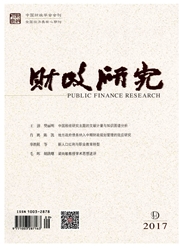

 中文摘要:
中文摘要:
本文结合陈共先生历年关于财政政策的一系列思考,历史地分析中国建国以来财政政策的更迭,以及财政政策对经济的作用机理。主要结论为:计划经济时期,财政政策以供给管理为主,政府通过强制储蓄手段积累资金,并通过财政拨款扩大投资;财政包干时期,财政通过放权让利改革实行供给管理,通过提高居民收入和降低消费成本实行需求管理;两次积极财政政策时期,财政通过政府投资扩张和对信贷资金的拉动,实现需求管理为主的政策;经济进入新常态后,财政通过降低企业成本和提高资源配置效率,实现以供给管理为主的政策。
 英文摘要:
英文摘要:
Combining with Professor Chert Gong's abundant researches on fiscal policy in every historical period, this article historically analyzes the changing of China's fiscal policy, and the influence of fiscal policy on the economy. Main conclusions are as follows. In the planned economy period, fiscal policy was mainly on supply management in which the government accumulated funds and expanded investment through forcing people savings. In the financial contract period, fiscal supply management embodied on fiscal decentralization and tax reduction, and fiscal demand management embodied on improving the residents' income and reducing the consumption cost. When China experienced two periods of positive fiscal policy, fiscal demand management embodied on government investment expansion and boost of credit funds. In the period of the new normal economy, fiscal supply management embodied on reducing enterprise cost and improving the efficiency of resource allocation.
 同期刊论文项目
同期刊论文项目
 同项目期刊论文
同项目期刊论文
 期刊信息
期刊信息
